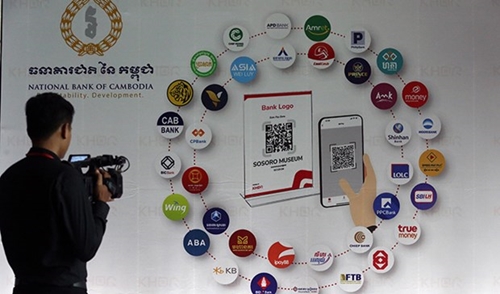    |
 |
|
(Photo for illustration: khmertimeskh.com) |
Addressing an event to promote the usage of riel with the participation of about 300 people who are local authorities, provincial banking officials and students in Stoung district of Kampong Thom province, she said the cross-border payment coverage will expand the riel circulation.
The official went on to say that with the new payment method, users are required to scan QRs in those countries to pay in riel for products or services they purchase overseas from the accounts they created with banks or microfinance institutions (MFIs) with riel in Cambodia because QRs cannot be scanned with U.S. dollar.
The usage of riel will also be promoted when tourists come and make payments in riel with Cambodia’s merchants, she said.
When tourists visit Cambodia, merchants need to have QR codes that enable them to scan in riel to make payments, thus, if they place QR codes in U.S. dollar at their counters, tourists will be unable to scan to make payments to them, Serey noted, adding that all these things will further boost the usage of riel. However, she did not mention when the deals will be reached.
Serey pointed out that the demand for riel usage has been increasing gradually as the circulation of riel in Cambodia has increased 16.6% on average annually to about 14.1 trillion riels (3.4 billion USD) in 2022 from approximately 356 million riels in 1998, but the rising U.S. dollar has still affected Cambodia’s economy, especially the inflation in terms of the foreign exchange.
The official said that the rising value of U.S. dollar against other foreign currencies with falling value may also affect the country’s tourism industry as foreign tourists need to convert their respective local currencies to U.S. dollar to pay for products or services in Cambodia even though their prices do not increase.
Speaking on June 14 at a meeting with nearly 20,000 factory workers in Por Senchey district of Phnom Penh, Prime Minister Hun Sen said the circulation of riel has been sufficient in Cambodia’s economy, adding the government has allowed foreign businesspeople and investors not to convert U.S. dollar to riel to pay wages to their employees at their factories.
Source: VNA